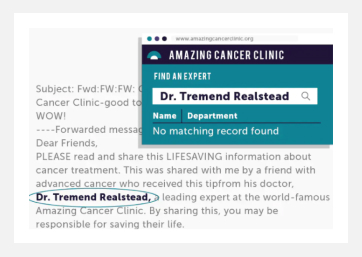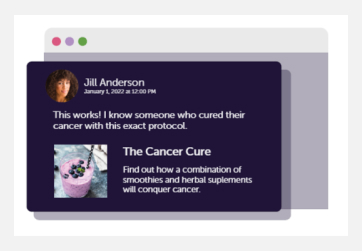How to find reliable online health information
It's easy to find information about health and disease online. But how can you tell if the information is reliable and if it relates to your situation? We've put together some tips to help you find reliable online health information by checking:
Checking the source of the information
Whether a health information article shows up in your news feed, appears in a search engine search result or is sent to you by a friend, it's always a good idea to stop and ask yourself where the information first came from. Once you find the original article you can learn a lot about how reliable it is by looking at the type of organization and their “url extension.” This refers to the 2-3 letters after the dot in the website address.
| Type | Examples | Reliability | Tips |
|---|---|---|---|
| Websites from United States government agencies
.gov |
|
10/10 |
These sites are reliable, and a good place to start your search on a health topic. |
| Universities, academic institutions, teaching facilities and hospitals
.edu |
|
9/10 |
These sites are usually reliable, but watch for press releases They are often a good place to start your search on a health topic. |
| Websites of nonprofit organizations
.org |
|
7/10 |
Older, larger and more established nonprofits tend to be fairly reliable. Check out their mission, goals and leadership - including their board of directors, advisory board and senior staff. |
| Websites of for-profit companies selling health interventions
.com, .net, .biz |
Labs and pharmaceutical companies have .com websites. Watch for supplement companies selling products as news; for example, Dr. Mercola (mercola.com). |
5/10
|
Most drug companies are well regulated and reliable. Companies selling supplements are less regulated and may be less reliabile. Most labs are reputable, but watch for companies selling tests directly to consumers. Sites like mercola.com publish unreliable health information and sell unproven supplements. Try to learn more about the business. Check their mission and goals. Make sure they are not trying to selling a product or a service under the label of "news." Always talk with your doctor before ordering an online health test or trying a new medicine or diet supplement. |
| News media stories from TV, radio, magazines, and cable news outlets
.com, .net, sometimes .org |
ABC, CBS, CNN, Fox, TIME, MSNBC, Wall Street Journal, etc. Media outlets such as PBS and Propublica are nonprofit organizations and have .org as their url extension. |
5/10
|
Sometimes reporters without a scientific background may get the science wrong. Good to check other sources to see if the reported findings match up. |
| Platforms that allow people to live stream or share commentary, photos, videos, stories and
text.
Social media (usually .com) |
Facebook, Twitter, YouTube, TikTok, Instagram, Reddit and Twitch |
1/10 |
These platforms are not well moderated and people are allowed to post and share medical misinformation. Make sure that you check any health information you find on social media with health experts before sharing or acting on it. |
Checking an article's content
Once you have checked the source of an article, a good tip is to look to see what the article is about: is it research, a personal story or something else? If the article is about research, is it research on cells in a test tube, on animals or people?

- Search to see if there’s been similar research completed by other experts in the field.
- Be aware of exaggerated language. Words like "poison," "scandal," or "shocking" might be red flags that the content isn't balanced or accurate. Content that seems too good, or promises to reveal "a secret that your doctor doesn't know" are red flags, too.
- Verify that any experts mentioned in the piece are real experts. Doctors and researchers will usually have a page on their hospital's website that shares their training and expertise.
Checking an article's relevance
To check the relevance of an article on cancer, think about how useful the information is for people in general and how it may relate to your situation or care. A good place to start is to see if what the article is about. Is it research, a personal story or something else?

If the article is about research, was this research on cells in a test tube or on animals? Research in a laboratory can take years before it is relevant to people. If it's a study on people, check to see:
- How many people were in the study? Larger studies with hundreds or thousans of participants tend to be more relevant than smaller studies.
- Has similar research been done in the past? Were the findings similar?
- Did the research lead to a change in expert guidelines? This takes a lot of research evidence. Research that changes guidelines is often very relevant.
- Compare yourself to the people in the study. The more they are similar to you (age, gender, diagnosis, genetic factors, race, ethnicity, health history, etc.), the more likely the research will apply to you.
If the article is not about research, what is it about? Personal stories can be inspiring or compelling, but they are not a reliable source of health information.
Discuss any health information with your doctor before you take any actions on it.
